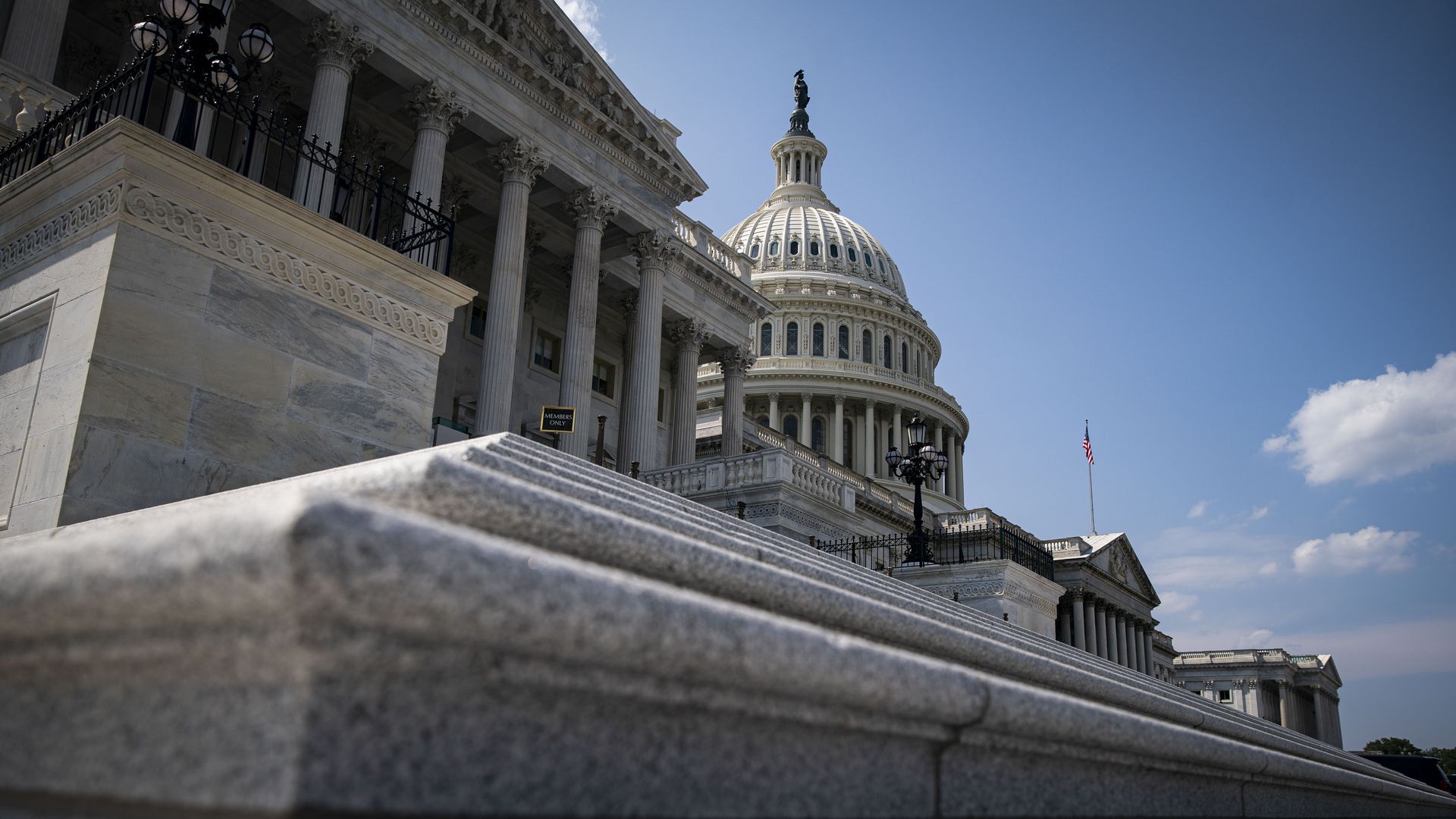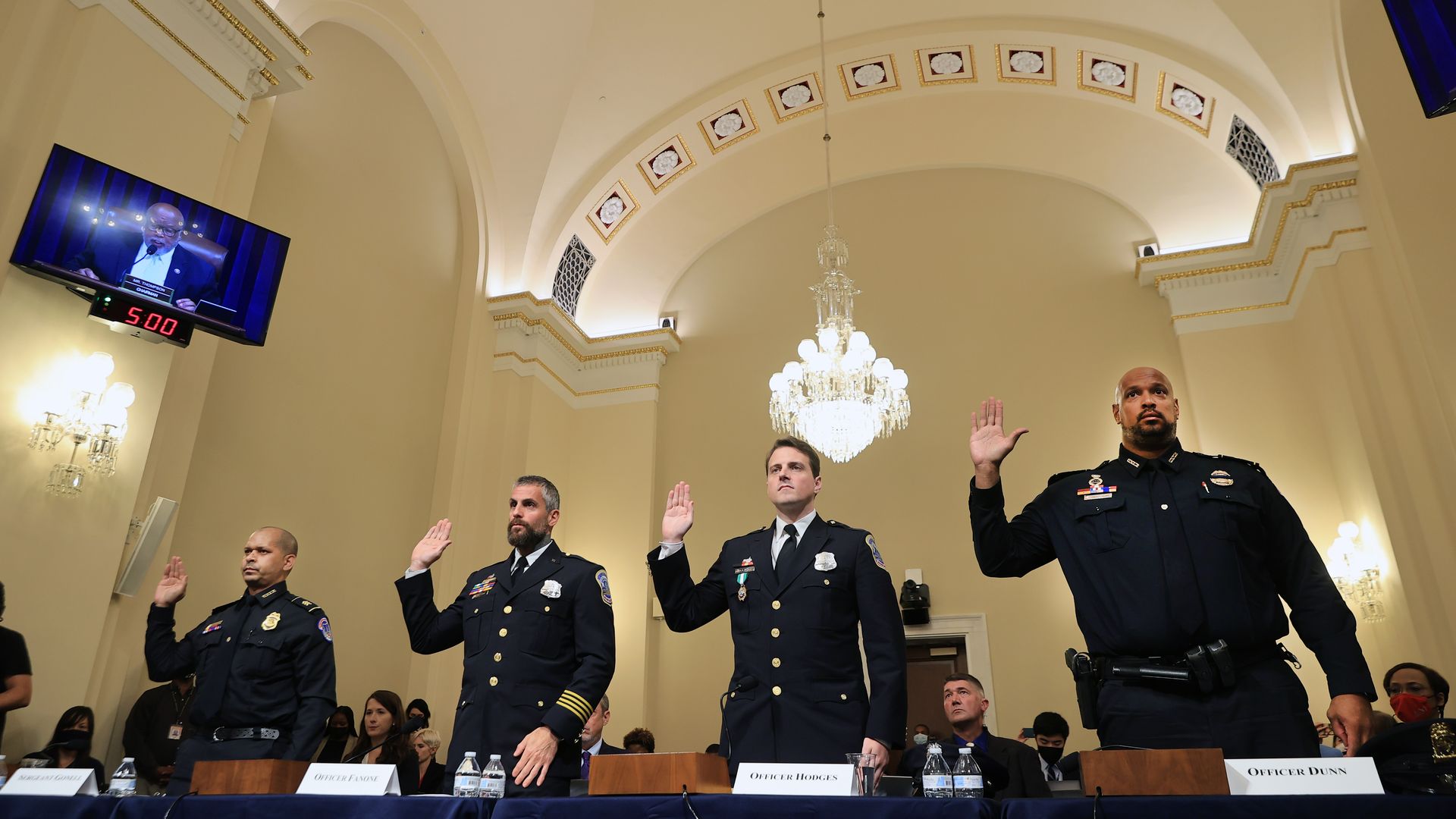| | | | | | | Presented By Facebook | | | | Axios Sneak Peek | | By Alayna Treene and Hans Nichols ·Jul 27, 2021 | | Welcome back to Sneak. When you thought you'd heard it all about Jan. 6, there was still more to the story. 📅 Join Axios' Russell Contreras, Niala Boodhoo and Alayna Treene tomorrow at 12:30 p.m. ET for a virtual event about systemic racism in America. Guests include Rep. James Clyburn (D-S.C.), activist and scholar Rosa Clemente and author Michelle Duster. Register here. Smart Brevity™ count: 1,535 words ... 6 minutes. Edited by Glen Johnson. | | | | | | 1 big thing: Biden weighing tailored vaccine mandates |  | | | Vice President Kamala Harris resumed wearing a mask indoors today. Photo: Ken Cedeno/CNP/Bloomberg via Getty Images | | | | Biden administration officials are debating how to expand vaccine mandates for some federal civilian health care workers as they prepare to put more testing pressure — and requirements — on the rest of the federal workforce, Axios' Jonathan Swan and Hans Nichols report. Why it matters: With the Delta variant surging across the country, officials are exploring ways to persuade or pressure Americans hesitant or downright opposed to getting a coronavirus vaccine. The CDC announced today it was reinstating its recommendation for vaccinated people to wear masks in areas where the virus is substantially present, as well as all who'll be returning to K-12 schools. - Like they did yesterday with their Veterans Affairs mandate, Biden administration officials are weighing the pros and cons of imposing strict vaccine mandates on select groups. No final decisions have been made.
- For these vaccine mandates, which go beyond simple testing regimens, officials are currently focused on federal health care workers throughout the government, including those in the Federal Bureau of Prisons and the Indian Health Service.
- The potential mandates would be phased in over time and require significant legal review.
Driving the news: President Biden told reporters today a vaccine mandate for federal workers was "under consideration right now," and on Thursday he'll speak directly to the challenge the Delta variant poses to Americans. - CNN reported tonight Biden will announce a requirement for all federal employees and contractors to either be vaccinated or submit to regular testing and mitigation efforts, citing a source with direct knowledge of the matter.
Between the lines: Administration officials do not consider onerous testing requirements to qualify as a vaccine mandate. - Instead, they see testing requirements as a means to convince workers to get vaccinated.
- "While no decision has been finalized, attestation of vaccination ... or abiding by stringent COVID-19 protocols like mandatory mask-wearing ... and regular testing for federal employees is one option under strong consideration," said a source familiar with the considerations.
The intrigue: The internal conversation around a strict mandate for military personnel was more fraught. - The dominant internal view is that it's better to wait for an official request from the Pentagon — which is unlikely to come until the vaccines transition from emergency-use authorization to permanent approval by the Food and Drug Administration.
Keep reading. |     | | | | | | 2. Biden border policies rebuild that wall |  | | | Illustration: Aïda Amer/Axios | | | | The president is building his own kind of border wall, Axios' Stef Kight writes. Why it matters: By maintaining a Trump-era policy allowing border agents to kick asylum seekers back to Mexico — and now allowing some migrant families to face detention and fast-track deportations — a Democrat who promised a more humane immigration approach is taking some tough stances. - The hardline approach also underscores the administration's concerns about border numbers that refuse to fall, despite its best efforts.
- As Axios reported Tuesday, 20,000 migrants were apprehended in the Rio Grande Valley area in just a week during the past month.
- Some 50,000 migrants also were released into the United States without a court date, an almost unprecedented action.
What they're saying: "It is frustrating to be at the end of July in this new administration and still have essentially a wall preventing asylum seekers from entering the country," Robyn Barnard of Human Rights First told Axios. - The administration has been "disappointing on some critical issues, including most importantly the refusal to end the Trump administration's inhumane Title 42 policy," said Lee Gelernt, the ACLU's lead attorney in a case challenging Title 42.
- "Most recently, we are concerned about the government's statement that it intends to use the expedited removal process for families, and continuing statements that people should not come to the United States now."
Border policy is complicated, disputed and deeply partisan, as those decisions attest. Migration, its causes and the failure to control it will likely fuel midterm election battles next year. - Biden and Vice President Kamala Harris have already frustrated progressives and immigration advocates by telling migrants not to come to the U.S. before the administration can restore systems for proper processing of immigration and asylum requests.
- "The administration is clearly concerned about border policies and is trying to get a hold of this issue in a way that threads the needle," said Doris Meissner of the Migration Policy Institute.
Keep reading. |     | | | | | | 3. GOP doubters unswayed by Jan. 6 testimony |  | | | House Minority Leader Kevin McCarthy and Rep. Elise Stefanik watch Rep. Jim Jordan speak before today's meeting of the Jan. 6 select committee. Photo: Al Drago/Bloomberg via Getty Images | | | | Rather than winning over House Republicans, the dramatic testimony delivered during the Jan. 6 select committee's first public hearing led them to double down on their criticism that the investigation is purely political, Axios' Alayna Treene reports. Why it matters: The remarks signal that regardless of the panel's eventual findings, many Republican lawmakers — most of whom didn't even watch today's hearing — will dismiss the proceedings as a partisan witch hunt. Driving the news: Axios spoke with multiple Republican House members following the graphic details laid out by four police officers on-site during the Capitol attack. Several other members avoided questions altogether. - While nearly all said they respected the officers who testified, it didn't change their opposition to the committee's investigation.
- Instead, Republicans continue to rail against House Speaker Nancy Pelosi (D-Calif.) for rejecting two of the five appointments House Minority Leader Kevin McCarthy (R-Calif.) made to the panel.
- They also told Axios they believe the Democrats' goal is to use the investigation to malign their party and Donald Trump, and blame both for what happened.
Many — including McCarthy and other speakers during a news conference preceding the hearing — tried to shift the focus to the security failures that led to the breach of the Capitol. - They blamed Pelosi, who they said was just as much in charge of Capitol security as then-Senate Majority Leader Mitch McConnell (R-Ky).
- Some Republican critics have accused her and D.C. Mayor Muriel Bowser of being concerned about the optics of a heavy federal law enforcement and military presence following criticism of former President Trump's use of such forces to quell Black Lives Matter protests.
What they're saying: - Rep. Rodney Davis (R-Ill.), who McCarthy initially appointed to serve on the committee before retracting all his picks: "The proof's gonna be in the pudding later when they start asking questions. ... Remember, the security posture was a failure of epic proportions ... because of failures of leadership in this institution."
- Rep. Mo Brooks (R-Ala.), who's running for Senate in Alabama, told Axios' Sarah Mucha: "I haven't given it any substantive thought at all. I've chuckled, on occasion, but what's going on with this group of people that Nancy Pelosi has put together?"
- Rep. Debbie Lesko (R-Wis.): "Speaker Pelosi kicked off her partisan circus. It's a sad state of affairs when Congress has an opportunity to provide the American people with answers but the authoritarian House Speaker has put her partisan narrative over pursuing the facts."
Keep reading. |     | | | | | | A message from Facebook | | The internet has changed a lot since 1996 - internet regulations should too | | |  | | | | It's been 25 years since comprehensive internet regulations passed. See why we support updated regulations on key issues, including: - Protecting people's privacy.
- Enabling safe and easy data portability between platforms.
- Preventing election interference.
- Reforming Section 230.
| | | | | | 4. Seven-week House recess faces cut |  | | | The steps to the House of Representatives. Photo: Al Drago/Bloomberg via Getty Images | | | | As members of the House fly home Friday for an extra-long August recess, they leave knowing they'll almost certainly have their break cut short, Axios' Sarah Mucha reports. Why it matters: Despite the threat of a spreading Delta variant, riveting testimony about the Jan. 6 insurrection and debate over an infrastructure bill that will affect roads and bridges coast to coast, lawmakers are currently scheduled to be away from Washington until mid-September. - "The fact that we take six weeks away from here in light of the circumstance that we face now as a country — both domestically and abroad — it is absurd," Rep. Dean Phillips (D-Minn.) told Axios.
- Phillips said: "I think we should be here regularly during the August recess, even absent an infrastructure challenge or COVID challenge or Jan. 6."
Rep. Nanette Barragán (D-Calif.) pushed back on the notion that taking a lengthy August recess could be bad optics for members. - "It's actually an opportunity to go back to our districts and encourage people to get vaccinated, with the rise of the Delta variant," she said.
- "The American people should know that when we are in our districts, we're working for them," Barragán said.
Members are currently playing a waiting game, and they expect they'll return as soon as the Senate passes an infrastructure deal. Their schedule likely won't be updated until that happens. - Another possibility is calling the House back in late August, per a House leadership aide, cutting the district work period regardless of the circumstance.
- House Majority Leader Steny Hoyer (D-Md.) set the expectation early in July, writing in a "Dear Colleague" letter that members will be provided "sufficient notice" of any changes in the schedule.
- In his own letter to senators, Senate Majority Leader Chuck Schumer (D-N.Y.) predicted "long nights, weekends, and remaining in Washington" into August to pass major legislation.
- Hoyer said, "The House will do what it needs in order to accomplish the same."
Go deeper: Rep. Bennie Thompson (D-Miss.), who chairs the select committee investing the Jan. 6 Capitol assault, told reporters the panel could have another hearing in August. |     | | | | | | 5. Pic du jour: Riveting recap |  | | | Photo: Chip Somodevilla/Getty Images | | | | U.S. Capitol Police Sgt. Aquilino Gonell, Metropolitan Police Officers Michael Fanone and Daniel Hodges, and U.S. Capitol Police Officer Harry Dunn recounted their violent encounters with rioters on Jan. 6 to some of the very lawmakers they protected. |     | | | | | | A message from Facebook | | Why Facebook supports updated internet regulations | | |  | | | | 2021 is the 25th anniversary of the Telecommunications Act of 1996, the last major update to internet regulation. It's time for an update to set clear rules for addressing today's toughest challenges. See how we're taking action on key issues and why we support updated internet regulations. | | | | 📬 Thanks for reading. A reminder your family, friends and colleagues can subscribe to this or any of Axios' other free newsletters by clicking here. |  | | It'll help you deliver employee communications more effectively. | | | | | | Axios thanks our partners for supporting our newsletters. If you're interested in advertising, learn more here.
Sponsorship has no influence on editorial content. Axios, 3100 Clarendon Blvd, Suite 1300, Arlington VA 22201 | | | You received this email because you signed up for newsletters from Axios.
Change your preferences or unsubscribe here. | | | Was this email forwarded to you?
Sign up now to get Axios in your inbox. | | | | Follow Axios on social media:    | | | | | |
No comments:
Post a Comment